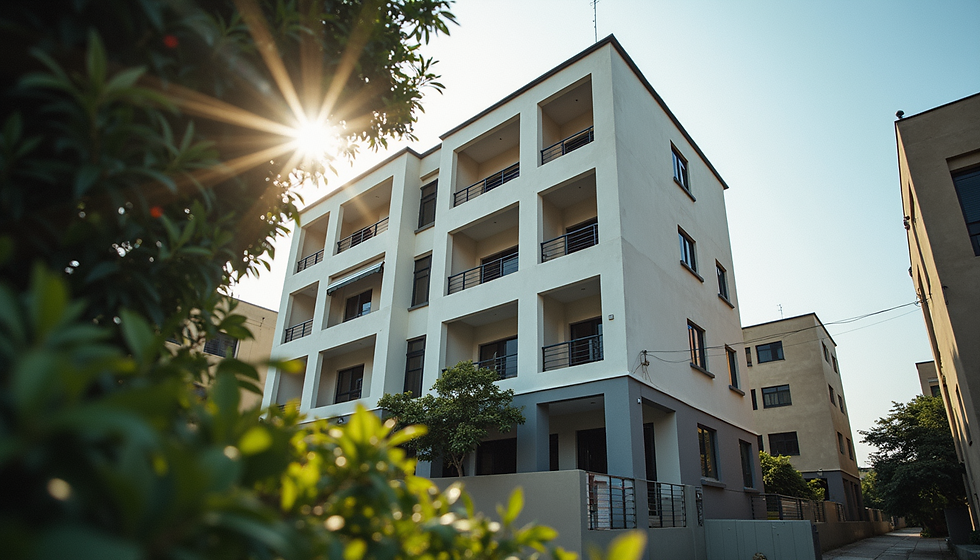Ghana's Real Estate Market 2025: Navigating Recovery and Resilience
- ronaldsena
- Aug 4
- 3 min read

In 2025, Ghana’s real estate scene finds itself at a fascinating crossroads—recovering from past shocks, adapting to global pressures, and aligning itself with bold reforms. The just-released Saasepedia Real Estate Market Report offers a panoramic snapshot of a market quietly gaining momentum across residential, retail, office, industrial, and hospitality sectors.
💹 Economic Pulse: Strong GDP, Weaker Cedi
Ghana’s real GDP climbed by 5.7% in 2024, a solid rebound from the previous year. Yet, fiscal strains persist—particularly as the cedi continued to depreciate, sliding from GH¢9.91 to GH¢15.38 per US dollar. Inflation settled within a 20–23% band, a relief from the intense 53.6% spike seen in early 2023.
📊 Investor Sentiment: Rebounding with Confidence
The Ghana Stock Exchange saw an exceptional 54% leap, making it Africa’s top-performing market of 2024. Bond yields also surged post-IMF bailout, and Treasury bill demand remained strong. Investors are clearly warming back up to the idea of growth.
🏘️ Residential Real Estate: Prime vs. Affordable
Urbanization and population growth continue to fuel demand—especially in high-end neighborhoods like Airport Residential and Cantonments, where 3-bedroom homes average over $500,000. In contrast, areas like Spintex and Adenta offer more modest options around $150,000 or less.
Monthly rents reflect the divide:
Airport Residential: ~$2,390
Adenta Estate: ~$356
With affordability lagging and inflation biting into disposable income, the government's planned Rent Act reforms could be pivotal in reshaping housing access.
🛍️ Retail: Holding Ground Amid Inflation
Despite economic pressures, Grade A malls in Accra and Kumasi continue to thrive with 85–99% occupancy rates. Melcom has rapidly expanded, replacing international anchor stores. E-commerce is slowly catching fire—projected to hit $1.04 billion in 2025, though it still accounts for just 1.8% market penetration.
🏢 Office Space: Stabilizing with Cautious Optimism
After a pandemic-induced slump, prime office rents have steadied at $29/m²/month, with elite towers like Atlantic Tower peaking at $35/m². Co-working spaces are on the rise, but their full impact remains to be seen.
🏨 Hospitality: Climbing Back Strong
Hotel occupancy rates jumped from 18% in 2020 to 41% in 2023, with luxury accommodations leading the recovery. Short-term rentals, especially via Airbnb, are surging under a new regulatory framework. Tourist numbers continue to recover, buoyed by infrastructure upgrades and domestic travel campaigns.
🏭 Industrial & Logistics: Gearing Up for AfCFTA
Challenges with inventory and warehousing persist, but Ghana’s hosting of the AfCFTA Secretariat gives it a unique edge. The country is poised to become a logistical powerhouse in export-oriented warehousing and industrial parks.
🧭 Land Market: Values Climb as Reforms Roll In
Urban land prices are on a steady rise—Airport Residential leads with $926.86/m², while areas like Ashale Botwe offer more affordable terrain at $149.44/m². The government’s moratorium on public land transactions and digitization efforts are reshaping the regulatory landscape. Notably, women’s land ownership has nearly doubled, reaching 49.6%.
🚧 Infrastructure: Physical & Digital Expansion
Road developments continue in key corridors. Meanwhile, data infrastructure is booming, with PAIX Data Centres expanding in Accra and logistics firm Agility planning a 30MW data hub in Tema.
🔭 Looking Ahead: Reforms Lead the Way
The forecast? Measured optimism.
Residential policy revisions aim to unlock affordability
Retail embraces tech-driven formats
Office spaces look to co-working models for evolution
Hospitality sees renewed growth from tourism investments
Industrial and logistics sectors gear up for AfCFTA-driven expansion
And the land market continues to reshape itself under regulatory overhaul
The full report is available here
Ghana’s real estate sector is walking a tightrope between opportunity and challenge. As investor confidence returns and reforms take hold, the landscape looks set for a thoughtful, transformative journey forward.
Looking to invest in real estate in Ghana? Get in touch with us today.
+233552119941



Comments